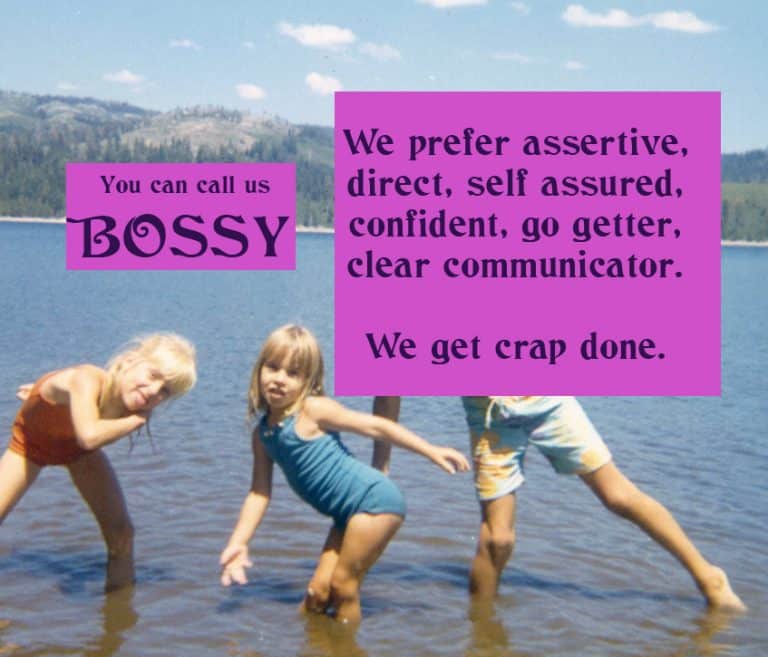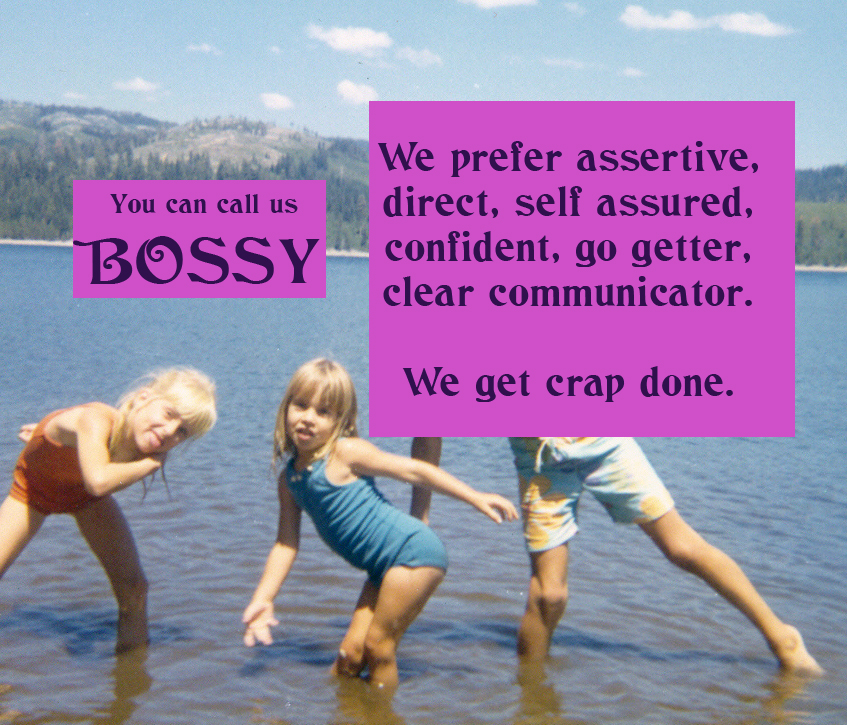There’s been a lot of talk about the word “bossy” lately. Sheryl Sandberg ala Lean In and Facebook started a Ban Bossy website that promotes leadership in girls. And of course there’s backlash from those who say bossiness and leadership have nothing to do with one another; and others who object to the campaign because they refuse to accept “bossy” as a pejorative term, and instead, like Tina Fey, Ms. Bossypants herself, embrace it.
I’m no stranger to the word bossy. I’ve been called it (and another lovely b-word) many times in my life. My sister and I got to a point in college where we wore it like a badge. I remember a time we were playing a game at a birthday party and had divided into two teams, Angela (the sassy blond you see above) and I in separate groups. People were having a hard time deciding how to proceed so I waited for a minute or two and when I sensed a leadership vacuum, I took charge. I have no desire to run the show, but when surrounded by passivity I go a bit nuts. A friend of my sister’s stood up and shouted at me, “I picked this team because I didn’t want to be with your bossy sister! But I think you may be worse!” and he stormed off to the punch bowl. My sister and I burst out laughing and were not so secretly proud of our take-charge abilities. We get stuff done.
What I would like to explore here are some of the ways being a BMW (bossy Mormon woman) are acceptable in the church, and some ways that aren’t. I’m going to limit myself to three in each category and would LOVE for others to share their insights as I am very much in the process of solving that intriguing question, posed by Tony Danza in the 80s: Who’s the Boss?
OK to be a BMW:
1. Events. If I show up for a baptism sponsored by the Ward Mission Leader (or a pancake breakfast put on by the Elders Quorum, or a fireside run by the bishopric) and find things running less than smoothly, I never get flack for rolling up my sleeves and taking charge. “You, set up tables over there.” “Find a liner for a trash can.” “I’ll locate an extension cord while you untangle the mike.” In fact I am revered for my willingness to problem solve and contribute to the success of the event. If food is involved, organizational skills needed, or “vision” is required, us bossy babes are seen as a godsend.
2. Children. I’m not talking officially tasked with kids as in Primary or YW, but if kids need some kind of adult intervention, we Mormons are fine with a BMW stepping in even when it is not her job description. For example, my dear friend Jen taught YW during the tenure of some very naughty teenage boys who roamed the halls during the third hour for the express purpose of causing trouble. One kid in particular, lets call him Willie, would pound on the door when he saw the girls praying thru the little window. Jen excused herself and gave this kid the lecture of a lifetime. Now Jen can make Oprah look inarticulate so I cannot pretend to recreate her diatribe. She was firm but not cruel, and let him know that his behavior would stop. It did. For weeks after people thanked Jen: his mother, the bishop, the YM president. Taking charge of children is a thumbs up.
3. Charity. This is another acceptable area where a woman can step out of her bounds and call the shots without being labeled a power hungry shrew. I heard about a ward council where the care of an elder gentleman was being discussed. The bishop and HP group leader bandied about different solutions. The activities committee chair, a woman, spoke up and suggested a plan. The men listened and followed her advice. Everyone was grateful she spoke up.
And then there are arenas where it is NOT OK wade in without being invited (and we rarely are):
1. Cultural Change. I’m not talking changing doctrine or policy, but women who try to alter “the ways things are” are deeply resented. Let’s take a simple thing like deciding to include girls in the Pinewood Derby. As far as I know the Derby is not a sacrament or an eternal principle. But in many cases this change has seriously caused trouble. Our Jessawhy wrote about the flack she received when she tried to implement it when she was an Activity Day leader. People were not merely in disagreement but seemed offended that she dared ask. And if said change is brought about by women, (as in this post by Starfoxy) I think folks feel more freedom to complain because a bossy feminist with an agenda did it. As Mormons we get so locked on to AUTHORITY that we confuse being in charge with God’s will, and because all our decision makers are men, we have come to think MEN=Authority. That, my friends, is a big problem. In a recent post at BCC the blogger shares a letter she wrote to her bishop and she raises the issue of girls and pinewood derby, among many other things. The comment that intrigued me most was not the haters who think that’s heritcal but the woman who defended the action because “the stake president said it was ok so it is.” Why do we need permission from our ecclesiastical leaders to let girls play with wooden cars? Watch out Derby Now proponents, they’re coming after your recommends!
2. Programs run by men. Don’t mess with them. Have a suggestion for the YM president on how to teach the new boys to pass the sacrament (because the newbies are wandering around like lost sheep)? Good luck. My girlfriend talked to the YM pres at least three times without success and for weeks her new deacon hid in the bathroom until sacrament was over. She solved the problem by contacting a kind 16 year old priest who agreed to come over and draw a diagram. Problem solved, but in a pain in the butt round about way. Another group of women could not get the scout leader to pass off any of their kids’ merit batches. “Let me worry about this,” he’d say as he blew them off. And let’s be clear, 80% of Eagle Scouts owe that title to their hard working mamas. I don’t think these guys were trying to be sexist jerks, but I do think they saw these women as stepping “out of their sphere” and encroaching on their turf. “Respect mah authoritah” as George Bush and Cartman from Southpark might say. I’m not advocating that the Bishop rearrange the home teaching routes on my say so, but if I have some insight, why not listen?
3. ANYTHING involving Handbook 1. Did you know there are two church handbooks? Handbook 2 is available online. Handbook 1 is subtitled “Stake Presidents and Bishops” and is only given to men. And the 9 women who serve in the General Auxiliaries. April wrote about what she brilliantly refers to as the “Sealed Book” here. I just don’t get why it’s kept such a secret. One would think that at least RS presidents would have access to it. On my cynical days this reminds me of the old Catholic leaders who insisted the Bible only be in Latin so that the masses could not read it. Whatever the reason, the result is that women are ignorant of the policies that affect them. Say you want your spouse to get a vasectomy. Your husband may tell you that the Handbook forbids it. Which it doesn’t. For the record, both vasectomies and tubal ligation are “strongly discouraged.” But I’ve seen women, strong bossy women, brought to their knees at the prospect of another surprise pregnancy. And had they known it was “discouraged” but not “forbidden,” it would have made a world of difference. And it seems icky to me to suggest that they should have to go to their bishop to get the skinny on their birth control. “Hi bishop, Heather here. Can I have an IUD? Are we a condom condoning people? How ’bout the ole snip snip?” I’ve also heard people say all sorts of things are in the secret book that aren’t, like you can only take the sacrament with the right hand, or you can’t have sex on Fast Sunday, or monkeys are prohibited as pets. Alright. I made that last one up. But my point is anyone can say something is in there and ALL but 9 women in the church have no way to verify it. I’m so blessed to have good men serving as my local leaders and I have never had any of them try to use the handbook to silence me. But I have seen it happen, and even the spunkiest of us have a hard time defending our actions against rules and regulations to which we are not privy.
So where do I land on this whole bossy issue? Banning words doesn’t seem effective. And some people are way too bossy, but generally we call them jerks. Personally, I don’t mind the term bossy. I think the woman with the issue of blood who touched the hem of Christ’s robe was bossy. Martha was super bossy for calling out Mary for not helping and taking Jesus to task for arriving after Lazarus died. And Mary of Bethany who anointed the Saviors feet with perfume was willing to tick off the disciples to do her part. Emma Smith and Eliza Snow could have a major bossy-off. But mostly the word simply conjures up images of 4 year old me sticking out my booty and my tongue, about to dive head first into a cold lake with my sister by my side. Mostly my bossiness allows me to get things done and hopefully bless people along the way. And when I run up against people who mistake their gender or their calling for true authority, my bossiness gives me the courage to dry myself off and get ready to dive back into the waters–with my sisters by my side.
How do you feel about “bossy?” If you are a BMW, in what ways has it allowed you to get stuff done? When does bossiness get in the way?







21 Responses
Heather, I love this post! Being a BOssy Mormon Woman can be a tricky thing. I have gotten the pat on the shoulder for being a bossy Mormon woman – callings, food drives, etc. but when I tried to help revive a dying cubs program I got real push back because basically…I didn’t have a penis so how could I so the job properly. Thankfully on that one things got sorted out (they saw the error of their ways and realized that indeed a penis wasn’t needed for the job).
Recently a friend of ours who is a new YM president suggested at one of their meetings that the RS president should be in attendance since there are so many…women in the ward…and he was told no!!??!!
This is great, Heather! I think I am a Bossy Mormon Woman, though it can also be exhaustive. I think of it as a sense of conviction—I *know* what is right, but no one else is stepping up to do it (at least in my acceptable time frame). So I do it, and one or two brave souls say they appreciate what I said/did, but the rest keep their distance—they seem to see me as an unpredictable firecracker, flaring up at random.
I am sitting on a fence at this moment, wondering if I have the energy and determination to challenge VT culture in my ward. This ward was created from 3 distant branches, as a means of unifying the people. VT is assigned in clusters, wherein the women are roughly and vaguely clustered and asked to just figure out visiting teaching in our area on our own. There is no direction to meet anyone outside of your immediate circle, and the cluster isn’t working….I asked no less than a dozen times to bring a meal to a new mother (who lives in my “VT cluster,” without family support and was on bed rest for the majority of her pregnancy), but no one in the “cluster” was even organizing meals!
I think I needed this post to remind me that being a BMW is part of my life’s calling—for the better.
Oh Heather, this is a truly excellent post.
I was about to write, “especially this” and share a quote, but then I would be sharing the whole last paragraph about the bossy women from the Bible and from the early days of the church, and about you, as a bossy women now diving and and drying off and diving in again.
My oldest sister is the bossiest person I know, in every good way. Her bossiness makes people’s lives (and whole wards) better.
Thank you, Heather, for being a Bossy Mormon Woman.
I have a hard time with “bossy” having such a negative connotation, and I have a REALLY hard time with it being used almost exclusively for girls. What do we call boys that are bossy? Nothing. We call them boys. Because we’re used to them being the leaders and calling the shots.
Heck yes, I’m bossy. I wish I were more bossy. I think the world would be a lot better with a few more bossy women.
Great point, Liz. If it’s boys/men doing it, we call it “leadership,” or something.
That being said, I can see the argument for the value in maybe reclaiming and rehabilitating the term “bossy.”
I totally agree. I would love to see “bossy” meaning assertive and effective, not mean or abrasive.
Mormons and gender roles. You’ve nailed it again, Heather!
Insightful, funny and spot on as usual. Love your bossiness. I would let you be in charge anytime!! I love it that although I have been gone from Belmont for 5 years now!!!, I can still recognize your references to past events. Made me laugh but also reflect on how those naughty boys have (miraculously) grown up so well. I think that it has a lot to do with the BMW who make up their community. The friend who took it upon herself to correct the young hooligan did so much more than get her bossy on. She helped him take a step toward the man that he had the potential to become. I am sure she knew that, which is truly the point after all.
I like this post, Heather. I particularly like what you said about Handbook 1, about how absurd it is that some people (many men) can creatively interpret Handbook 1 for other people (women) because the other people can’t check them on their interpretations.
About your never getting negative feedback mentioned in OK #1. The bossy personality really isn’t possible without an authoritarian or convinced of being in the right personality. Most people have learned that contending with a bossy person is futile and the best course is to just let the bossy one boss, it’s less hassle for everyone involved. But this is usually done grudgingly and not without negative feelings. Just because you haven’t heard objections to your self styled admirable personality trait doesn’t mean they don’t exist; and, depending on how often you exercise this trait, it doesn’t mean that these negative feelings are not expressed and shared among other ward members with passion when you are not around. I say this because we have a very take charge person in our ward who does just what you describe. She thinks she is just taking charge to get things done, just like you. What she doesn’t see is the constant eye-rolling shared by everyone she is bossing around.
Having said that, if you descended on my baptism service or EQ activity with your attitude I would have no problem telling you to back off. I’d probably say something like, “I would never imagine taking over any activity that you were in charge of, why do you assume that doesn’t apply to you?” Is that too bossy?
I think you missed the point, KLC. Heather isn’t talking about grabbing the reins from someone who is doing a fine job of managing their own stewardships. All her examples were of times when there was a lack of organization/leadership so women who had the necessary bossiness stepped in and got things done, and people were grateful. The only people I’d suspect of eye-rolling in a situation like that are petty, jealous folks who wished they’d done it themselves.
And of course her other point is that stepping in and getting things done has a gendered element to it (as does everything in this church), and it shouldn’t.
“Bossy” does not equal “Leader”.
Most people associate bossy with rude. When a person is not “in charge” of an event/activity and jumps in to take over, it is not appreciated or welcomed. Some of the best activities I’ve lead are a result of the ones that I failed at. One of the issues discussed in Ward Councils and Bishopric meetings are (or should be) the “good” and “needs improvement” of each event. Besides, if Sister So & So is allowed to always push her way on everything that is not to her (or her group of friends’) liking, people will stop caring and putting forth their best because it will be excepted that they will be pushed to the side. Hopefully, before it gets to that level, a loving bishop will step in and address the issue.
Emily, your response is an encapsulation of the bossy personality. The bossy person truly believes that only they can see the chaos and disorganization and that only they can step in and stop the madness. This justifies their intervention in their mind. Can we agree that there is no one way to put on a pancake breakfast? Can we agree that, after complying with the hand book, there is no 0ne way to put on a baptismal service? If someone is exercising their stewardship in a way that is different from what I or you or Heather would do it, what right does that give any of us to intervene?
There is a huge difference between being bossy and being helpful. A helpful person would ask the one in charge, “What can I do?” or “Would you mind if I take over X so that you can concentrate on Y?” No one rolls their eyes at a helpful person. That is not true about someone who descends on an activity with a preordained vision of what should be done and how it should be done; a vision that just coincidentally happens to be exactly congruent with how they would do it.
I think KLC and Mel haven’t seen Heather in action…I completely agree with them. In some cases, (maybe every ward has one?) there are people who have an arrogance and social ineptitude, causing hurt feelings and strained relationships.
However, I’ve served with Heather (and others) who have been able to do this successfully. I’ve certainly been in charge of events where I’m grateful for someone to take over a piece of the headache of an activity I’ve created for myself as long as they do it with a sincere desire to make the event better and help the participants have a good time. It falls apart when ego comes into play.
I don’t get this. Growing up, boys weren’t natural leaders nor did they call the shots. There were a few guys who would take charge in the leadership vacuum, but those that did step forward were called “bossy” the same way people might call a girl “bossy.” Virtually all student organization leadership positions were filled by — you guessed it — girls. Anyway, as to the church things in the post: Cultural change – pinewood derby is a poor example simply because it is a BSA/Cub Scout thing. Some units have a Mother/Daughter derby on their own, others have a derby just for Achievement Day girls, etc. But it might not be a good idea to impose on the Pinewood Derby any more than it would be good to impose Scouts going to Girls Camp. Programs Run By Men – no one, including sisters, like being told how to do their calling. I know as well as I’m sitting here that if I walked up to the RS/YW/Primary presidents with “suggestions” on how they ought to be doing their jobs, they would be resentful. I’ve heard my own wife gripe about sisters and brothers who offer advice that isn’t solicited. Most people, if diplomatically approached, have no problem with an offer to help out in some way. The problem is that usually offers aren’t made diplomatically. I think those we might label bossy tend to have a perfectionist streak in them so they are quick to see the failures and deficiencies. That’s not altogether bad, but it can come off a bit objectionable. Handbook 1 – the “policies” stuff in handbook 1 are the same as found in the end of handbook 2, so there are no secrets. The rest of the junk in Handbook 1 is administrative in nature. Personally, I don’t understand why it isn’t available to everyone. Remember, though, it isn’t given to executive secretaries, High Councilors, EQ Presidents, HPGL”s, Ward Mission Leaders, etc. I think only the bishop, his counselors, and the clerk are given handbook 1, as are the Stake President, his counselors and clerk. My life experience is that if you want to sit down with a member of your bishopric and thumb through Handbook 1, it wouldn’t be a problem. My guess as to why it isn’t available to everyone? Because there are so many who have a propensity to critique and offer suggestions on how others should fill their callings, particularly stake presidents and bishops. It would get old, very quickly, if the SP/bishop had to respond to every complaint of “well, it says in Handbook 1 you should do X, Y, Z.” People do it enough already. I think most of us have enough to do within our own sphere of responsibility to not worry too much about all the junk a SP/Bishop has to keep up with. In the end, there are plenty of men and women who tend to ‘get things done’ when no one else will step forward. Culturally, I think the term “bossy” is a simple continuation from the fact that historically, the people just a step above common workers were called bosses, and in certain trades, they were the men who had the most responsibility for getting the day to day work completed. No doubt the term “bossy” has come to have a negative connotation, but as long as you’re just as willing to do the work as you are willing to tell others to do the work, I wouldn’t worry about the label.
Just a note, my husband, our EQP, has a copy of CHI1.
He ( the EQ President) is not on the distribution list for Hanbook 1. He is not supposed to have it. Look at the introduction pages and you’ll see the distribution list on page v or vi.
[…] I’m no stranger to the word bossy. I’ve been called it (and another lovely b-word) many times in my life. My sister and I got to a point in college where we wore it like a badge. I remember a time we were playing a game at a birthday party and had divided into two teams, Angela (the sassy blond you see above) and I in separate groups. People were having a hard time deciding how to proceed so I waited for a minute or two and when I sensed a leadership vacuum, I took charge. I have no desire to run the show, but when surrounded by passivity I go a bit nuts. A friend of my sister’s stood up and …read more […]
I too am bossy and have been since childhood. I have recent experience in the workplace where I have tried to alter the way things are only to be resented for it, I have not had that experience at church (at least that I know of). I do agree that the local RS President should have access to a copy of Handbook 1.
This post makes me smile. Thank you, Heather, for your wonderful humor and insight.
I actually wish I was more bossy. I’m naturally on the passive side and it takes a lot for me to step up and take charge. I love that you embrace your bossy self!
I was given handbook 1 while serving as the Stake Relief Society President.